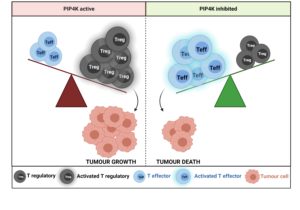New research has identified potential treatment that could improve the human immune system’s ability to search out and destroy cancer cells within the body. Scientists have identified a way to restrict the activity a group of cells which regulate the immune system, which in turn can unleash other immune cells to attack tumours in cancer patients.
“A patient’s immune system is more than able to detect and remove cancer cells and immunotherapy has recently emerged as a novel therapy for many different types of cancers.” Explained Nullin Divecha, Professor of Cell Signalling at the University of Southampton who led the study. “However, cancer cells can generate a microenvironment within the tumour that stops the immune system from working thereby limiting the general use and success of immunotherapy,” he continued.
Detection and removal of cancer cells by the immune system is carried out in part by a group of cells called Teffector cells (Teffs). How well Teff cells work in detecting and removing cancer cells is in part dictated by other T cells called T-regulatory cells, or Tregs for short. Tregs physically interact with the Teff cells and produce molecules which reduce the ability of the Teff cells to work properly.
Prof Divecha added, “Tregs carry out an important function in the human body because without them, the immune system can run out of control and attack normal cells of the body. However, in cancer patients we need to give the Teff cells more freedom to carry out their job.”
Molecules released by tumour cells compound the problem by attracting and accumulating Tregs, further reducing the activity and function of Teff cells. Mechanisms do exist to inhibit Treg cells, however as Treg and Teff cells are very similar, these generally also lead to inhibition of Teff cells.
In this new study, published in the journal Proceedings of the National Academy of Sciences of the United States of America, scientists from the University of Southampton and the National Institute of Molecular Genetics in Milan showed that inhibition of a family of enzymes in cells called PIP4K could be the answer to how to restrict Tregs without affecting Teffs.
The research team isolated Tregs from healthy donors and used genetic technology to suppress the production of the PIP4K proteins. They observed that loss of PIP4Ks from Treg cells stopped them growing and responding to immune signals which would therefore stop them from blocking the growth and function of Teff cells.
Importantly, the loss of the same enzymes in Teff cells did not limit their activity.
“This was surprising because PIP4Ks are in both types of T cells in similar concentrations but our study shows that they seem to have a more important function for Tregs than Teffectors,” said Dr. Alessandro Poli who carried out the experimental research.
Inhibition of PIP4K as a potential therapeutic for patients requires the development of inhibitory molecules. “Towards this end we show that treatment with a drug like inhibitor of PIP4K could enable the immune system to function more strongly and be better equipped to destroy tumour cells.”

Notes to editors
The full study “PIP4Ks impact on PI3K, FOXP3 and UHRF1 signaling and modulate human regulatory T-cell proliferation and immunosuppressive activity.” has been published in PNAS .
For further information and interview requests please contact Steve Bates, Media Relations Officer, University of Southampton, s.d.bates@soton.ac.uk, 07342 060429


